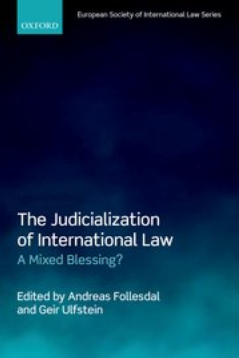Substance and Style
WTO judicial decision-making in 'trade and ...' cases
- Publication
- Citation
Substance and Style: WTO judicial decision-making in 'trade and ...' cases von Dr. Christiane Gerstetter 2021, 634 S., geb., 118,– €, ISBN 978-3-8487-5768-8, (Schriftenreihe des Zentrums für Europäische Rechtspolitik der Universität Bremen (ZERP), Bd. 78)
International trade agreements have repeatedly been criticized for promoting trade interests at the expense of other policy objectives, such as environmental protection. The fact that many trade agreements include dispute settlement mechanisms and sanctions for violations reinforces such fears; environmental or human rights agreements do not usually have such mechanisms.
Against this background, Christiane Gerstetter, Senior Fellow in Ecologic Institute's Legal Team, examines in her PhD thesis how the dispute settlement bodies of the World Trade Organization (WTO) have decided non-trade cases. These are cases in which national measures that serve non-trade objectives such as environmental and health protection are under judicial scrutiny.
The central role of the WTO dispute settlement system
Any state that is a member of the WTO can initiate WTO dispute settlement proceedings if it believes that another WTO member is violating WTO law. Since the WTO's inception, dispute settlement bodies have published several hundred decisions, making WTO dispute settlement the most active judicial mechanism at the global level. WTO dispute settlement decisions are also legally significant beyond WTO law because many bilateral trade agreements refer to WTO law or contain similar legal clauses to WTO agreements.
The study analyses two crucial dimensions of judicial decision-making in the WTO: the substantive outcome of decisions and the style of argumentation used. Christiane Gerstetter uses legal theory and empirical studies of judicial decision-making as the basis for her analysis of WTO case law. A basic assumption of the book is that WTO law – like other legal norms – is indeterminate and leaves judges some room for maneuver. The way in which this leeway is used by the WTO dispute settlement bodies can, according to Gerstetter, be explained by the fact that WTO dispute settlement bodies seek to legitimize their decisions. Both the substantive outcome and the style of WTO judicial decision-making contribute to the legitimacy of the decisions.
Balanced substantive interpretation of WTO law, formalist style
In terms of substance, WTO dispute settlement procedures have a mixed outcome according to the study: The interpretations of the WTO Appellate Body, the WTO's highest dispute settlement body, neither consistently favour trade interests nor systematically maximize WTO members' regulatory space.
The dispute settlement bodies have also developed their own style. It is predominantly formalist, i.e., the dispute settlement bodies present their decision as a direct and compelling consequence of the agreements negotiated by WTO members; they avoid the impression of having any decision-making space of their own. Both the substantive outcome and the style of argumentation can help avoid criticism of the WTO's dispute settlement practices and, by extension, of the WTO as a whole, according to the author.
The study was submitted to the law faculty of the University of Bremen as a doctoral thesis and was published in the series of publications of the Center of European Law and Politics. The printing of the book was supported by a grant from the Förderfonds Wissenschaft of VG Wort.
